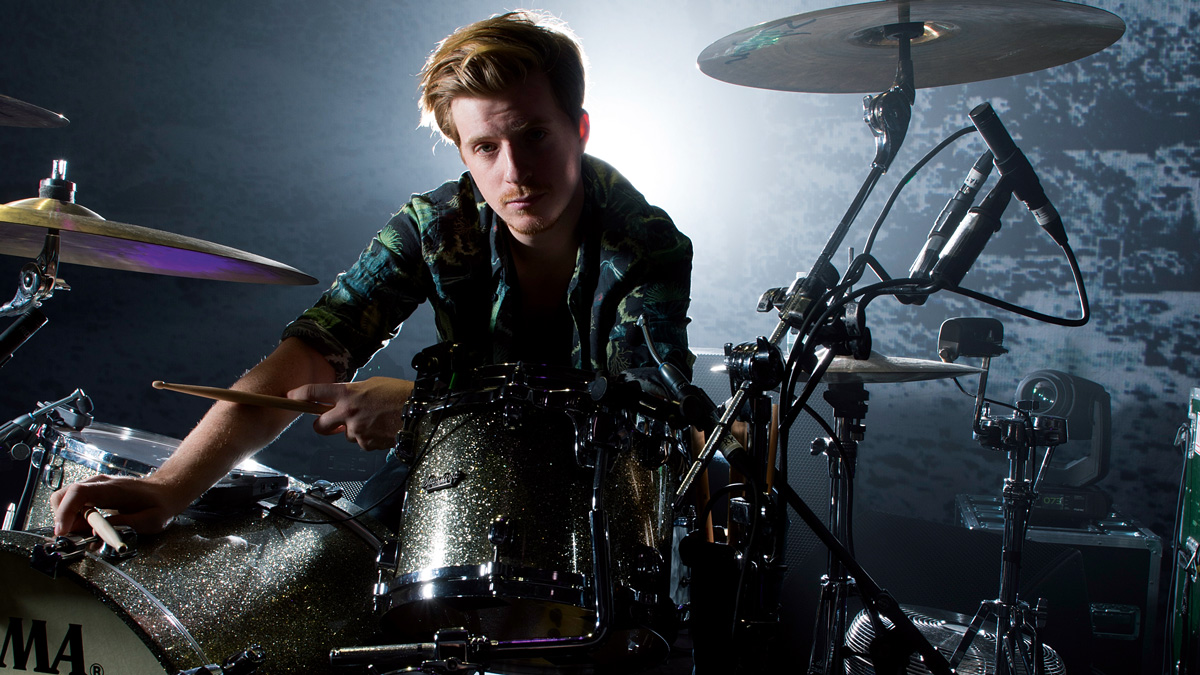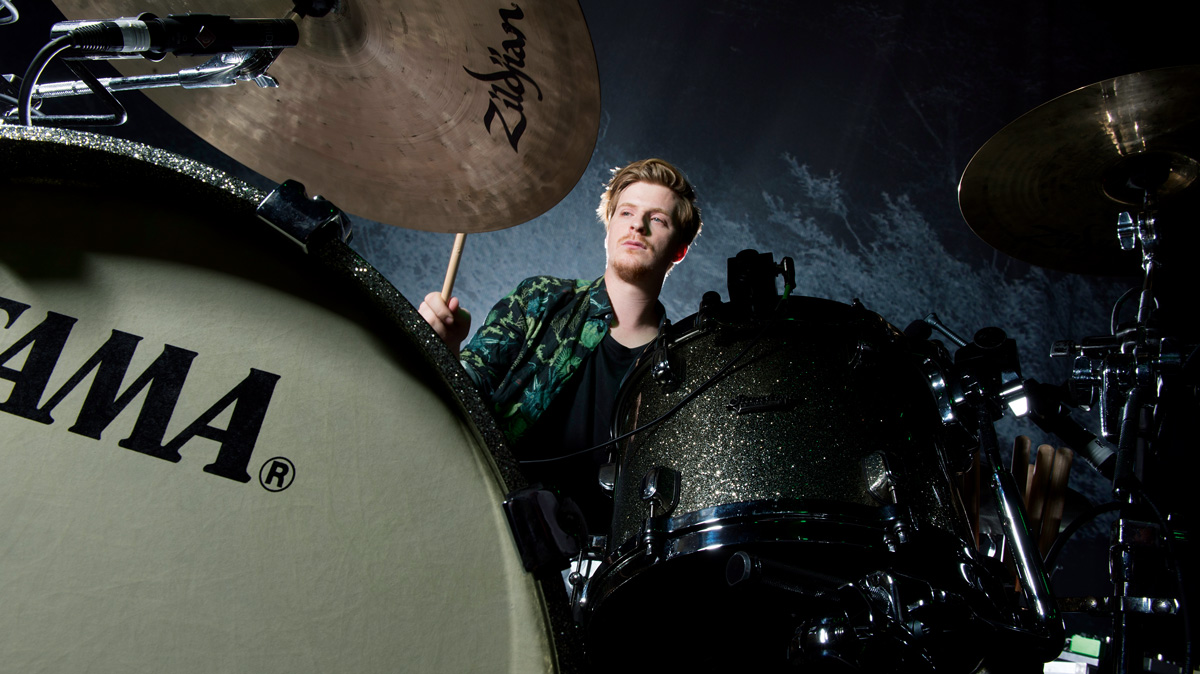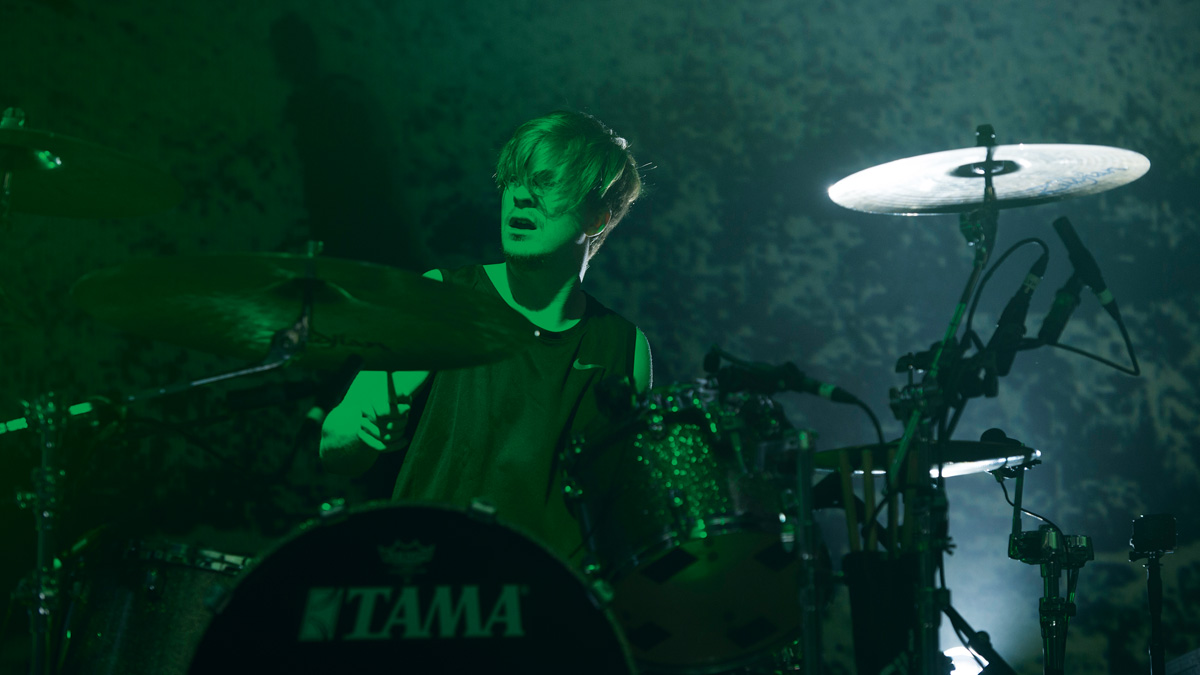Jack Bevan talks Foals, mega tours and why he's still a student of drums
Huge interview with Foals sticksman

Jack Bevan on the rise and rise of Foals
Jack and Foals’ frontman Yannis Philippakis first met in their hometown of Oxford, and bonded over a love of leftfield, complex music – a collaboration that saw them form first math-rock outfit The Edmund Fitzgerald, and then Foals.
Foals’ debut album Antidotes hit in 2008, and spawned such dance-rock bangers as Balloons and Cassius. Follow up Total Life Forever (2010) saw the band evolve, turning their epic sound up to 12 with This Orient and Spanish Sahara, creating complex yet huge anthems in the process.
Third album Holy Fire (2013) was a deeply grooving yet rockier affair and included the brilliant Inhaler, which boasts one of our favourite ever lead-ins. The band were quick off the mark with follow up What Went Down in 2015, with the monster title track and sublime Mountain At My Gates.
When we caught up with Jack, he and the band were winding up an incredible 2016; a year that saw them totally nail it on the world’s biggest stages. Foals’ live shows are exciting, spontaneous performances, fuelled by a phenomenal band- chemistry, with each player also incredibly skilled on his instrument. In the UK, their Glastonbury and Reading/Leeds shows were highlights of the festival year, and they have just completed a mammoth tour of the American continents, North and South.
“It’s been great,” Jack tells us. “Because it’s such a big continent you have to take lots of days off, so it’s been a bit of a holiday as well! We’re playing [Buenos Aires] tomorrow and then we’ve got two days off before we go back to America. The fans down here are really passionate and sweet and they meet you at airports and have presents and stuff, it’s a really bizarre thing to see.”

Early days
What was the first rock beat you learned?
“You know I think it’s probably just the classic 4/4 rock beat, the very first thing, and then immediately afterwards the punk beat [mimics Green Day type beat], but I think when I first started my main drive was, rather than having a sort of natural groove or swing or funk to it, I just wanted to be able to play as fast as possible. I remember just practising fills around the toms, just over and over again, really, really fast because I was in a punk band at that time and that was kind of the goal – to just be really fast.”
What was it that got you interested in the more complex music that you made, first with The Edmund Fitzgerald and then Foals?
“I really wanted to try something just a bit more challenging. I posted an ad on a website called oxfordbands.com, and Yannis [Philippakis, Foals vocals/guitar] responded to it and posted me a cassette of stuff he was into, and there was a lot of overlap. We were both listening to Don Caballero, and stuff like Boards of Canada, I think we had this kind of musical connection in that we both liked this kind of leftfield, more technical music and we just rehearsed a lot.
Yannis would get suspended from school for taking a day off to rehearse, and we would go and play anywhere that we could find, with similar bands that wanted to play with us.
“There would be like nine-hour practices. Yannis would get suspended from school for taking a day off to rehearse, and we would go and play anywhere that we could find, with similar bands that wanted to play with us. Neither of us could drive so we’d get the National Express up to Leeds or wherever with my snare drum under my feet and cymbals under my arm. I definitely think we had the work ethic about it and everything was so exciting. I remember when we were in the Edmund Fitzgerald we got an email from an A&R intern at Sony, and he was like, ‘can you send me some stuff?’
“And at the time being 17 years old we were like, oh my god we’ve been signed to a major [laughs]! It was basically just a guy had seen our name on a poster and wanted to hear what we were doing, but at the time it was this crazy thing, and when you start off doing something like that you’re so bright-eyed and bushy-tailed... some of the stuff we did then I’d keel over if we had to do now – like five of us sharing a Travelodge sofa and stuff!”
With The Edmund Fitzgerald you were doing some pretty complex stuff, odd-times and the like, and you’ve brought that with you to Foals. Were you really pushing yourself to come up with that stuff?
“To be honest most of it back then was memory-based, there were points in the Ed Fitz where I’d feel like I’d forgotten how to play beats because constantly in my head I’d be going, ‘1-2-3-4-5, 1-2-3-4, 1-2-3-4-5-6, 1-2-3-4-5,’ and that’s basically how the drums for that band came about: okay I’ve got a five here so I’ll play that simply then I can do a fill over the four, then I can just sort of do kick drum stabs for the three... and it’s quite exciting because with more standard 4/4 music you’ve been down the beaten path so many times, but whether you’re conscious of it or not you end up doing stuff that loads of other people have done because, okay we’ve got to the end of the bar, let’s do a fill, but when you’re constantly changing bars and counting and doing polyrhythms there’s no template and so it gives you the chance to be really creative. And at the time I didn’t actually really worry about being too technical, because the clocking of the music is technical in itself so even being able to match the guitar rhythms with drum beats would have been hard enough just because the music was so constantly changing. It would never be a 4/4 beat so it was a licence I guess to be able to try things and be a bit creative.”

Going live
This kind of math-rock approach lent itself well to the kind of dance-rock stuff you were doing early on in Foals, didn’t it?
“When Foals started after the Edmund Fitzgerald broke up I did feel like I was relearning the drums a little bit because we went from pure technicality being the most important thing to wanting to create this excitement, and we just wanted to be the party band and that’s how it started. I think we’d got a bit bored of gigs where it was guys who were older than us stroking their beards and it wasn’t as fun and sexy and exciting as making party music.
“And that’s what we did, we booked shows, and they weren’t even shows, they were house parties... and because of that I never had much space and that limited the drumming that I was able to do because I’d have a kick, snare, hats and maybe a cymbal, and there’d be people all the way around me so that was kind of limiting. And I found that exciting because in the past I’d be doing stuff all over the toms and it’d be very intricate... just playing four-to-the-floor, with just a couple of pieces, was very liberating.
We have a lot of nervous energy live and that is partly why we play so hard and so passionately.
“And I think having a background of doing all the mathy stuff gave me a different perspective on the dancier stuff, tracks like Balloons early on has almost like a breakbeat kind of thing, which every time I played it, I played it differently – and I think if I hadn’t done one thing, I wouldn’t have been able to do the other.”
Do you use many electronics?
“With the live show the only thing we do that involves any kind of electronics is, in our song Snake Oil I have a four-beat loop that I trigger, or my tech triggers, then I trigger it back on when I start the second phrase, and we use triggers on one song to get a different non-traditional drum sound. But there have been tracks like Birch Tree on the new record that we tried playing sort of percussion-y, but weended up stopping doing that and just doing it live. I think we are quite passionate about the authenticity of the band, maybe to a fault sometimes, because rather than playing the song exactly as it is on record we would adapt it so that we can play it live, because one of the biggest strengths that we have is our chemistry when we play live.”
That chemistry really comes over...
“When we made Holy Fire our producer was saying how fascinating it was that every single time we played a certain song we would do exactly the same moves and tempo throughout the track, so in, say, a build up we might speed up by 5bpm but we were all doing it together, and those sorts of swells and speeding up and slowing down, only slightly, can really deliver a kind of excitement that we wouldn’t get from totally doing it to click.
“A friend of mine, he’s in band that does use – not a backing track, I don’t think he’d be too happy me calling it that – but he is quite demoralised by his position because he feels like there’s a glass ceiling on the live show in that it will always be so good, but it can only be this good. Whereas we have the ability to put on quite a bad show, but we also have the ability I feel to do something that feels bigger and more exciting than otherwise. We have a lot of nervous energy live and that is partly why we play so hard and so passionately and a lot of the time, in tracks where I have got loops on or whatever, I do find that I’m concentrating more on playing perfectly to the loop than I am expressing myself in any other way, whether that’s just getting into it or whatever.”

Always learning
You have quite a few big drumming moments in Foals, tracks like Inhaler spring to mind, do the rest of the band encourage you to go for it on the drums?
“I guess it depends from song to song and also I think as a band, because of the knowledge that once we make a record we’re going to be touring it for two years, we have these elements inside us that we want to get out on every record. So there’s the rock side of the band, and the pop side and the more delicate song-based side of the band. And definitely in the rock side that’s where it’s encouraged a lot because in rock songs, having big fills and that kind of thing just adds to it all.
“So there’s that element, but then in the pop element, the more song-led tracks that are written on a Rhodes piano with voice, my job is more to try and drive the song but without drawing attention to anything other than what’s going on with the lyrics and the keyboards. So it varies from song to song. But also from producer to producer – some producers prefer to simplify stuff and some producers like to accentuate that.
“There’s a lot of times in the past – and a lot of the times I agree – a producer’s like, ‘Can we simplify this?’ or, ‘This is where we should put a big fill,’ or whatever. I think one of the coolest things that ever came out of pure spontaneity in the studio was when we were recording Holy Fire. Flood and Moulder, the two guys we were working with... well the first thing they did, which was amazing, was they said, ‘Okay, for the first four weeks we’re just going to work through the songs,’ so we have Alan Moulder in the mixing room and Flood standing with us. Every time we finished a song, Flood would have these incredible, really focussed comments and criticisms and compliments or whatever, and he picked up on absolutely everything, and then we’d play it again.
When I first started having lessons my drum teacher said I didn’t have the patience to amount to anything more than a pub drummer because I didn’t have the patience to slow down and learn the fundamentals of drumming.
“And what actually happened was at the end of the month they were just like, ‘Yeah, we just basically recorded the whole record because we’ve been recording the whole time and because you guys didn’t think you were recording, we got the most natural takes out of you. Well done!’ And we have this song Providence where we had an end section and a beginning section and we didn’t know how to attach the two, and Flood was like, ‘Okay, I think we can do something kind of nutty with the drums maybe, and that could tie it all together. And I said, ‘What do you mean?’ and he said, ‘I don’t know, well, you’re the drummer – have a go, do something audacious that can attach the two parts.’ And I was like, ‘Oh well, okay, maybe I’ll go and practise and we can do it tomorrow.’ And he said, ‘No, we’ll do it now, you’ve got three goes and we’ll use the best one.’ And I was sort of panicked by this big ask to just pull something amazing out of my arse, basically. And that’s what it came from. I think they used the first take, where essentially we were playing hard for the first bit and then I just kind of went nuts and used a single roll as fast as I could and then it kind of stuck!”
Are you still a student of the drums?
“Oh, totally. When I first started having lessons my drum teacher said I didn’t have the patience to amount to anything more than a pub drummer because I didn’t have the patience to slow down and learn the fundamentals of drumming. And at the time I hated her for it, and now it’s really come full-circle and actually I wish I could have gone back and told myself to learn things then that I would like to know now.
There are things I know I’m good at, like fast single rolls, doubles on the kick and that sort of thing, but then in our band I don’t use them that much.
“But then the other side of me, I think if you become too much of a student of the drums it can flatten you out to maybe sounding like a lot of other drummers, I think with our band we are all very naïve in what we do and that’s what makes us unique. If you told Yannis to play a scale he wouldn’t be able to do that for you, but if you just told him to play something it would be absolutely, bewilderingly beautiful. But just not knowing exactly what it is that you’re doing.
“There are things I know I’m good at, like fast single rolls, doubles on the kick and that sort of thing, but then in our band I don’t use them that much. I think there’s a balance you can find and I feel that in our time off, after this record - we’re going to take a break of six months off - for 10 years all we’ve done is writing, recording, touring, over and over again, and now I think we’re at the point where we need six months to just totally chill out and do other stuff. In that time, the same studio that I rehearsed at for Glastonbury, I’m just going to go down every day in the week and spend a couple of hours.
“I reached out to a Tama guy through my Tama rep - Kaz Rodriguez, we were going to meet up before this long tour but didn’t get the chance, but I’d like to meet up with him and get some pointers on the things I can practise and things I can learn because I’m at an annoying point now where, when I practise and when I rehearse I don’t have any new stuff to work on really, other than things that I haven’t had enough time to build on. So there are particular types of linear fills and drumming that I would like to get better at, just left-right foot independence. I see people doing it and I think it’s so cool but I don’t know the stickings to actually do it.
“I also want to learn a lot more about production and drum machines, modules, effects, that kind of thing. The studio is an immensely exciting place but a lot of the time you go in there and you see this amazing stuff and then you leave and you don’t know how to manipulate it or do anything so I think it would be a good period to actually get my head around some of the elements you can use to make the studio an instrument.”